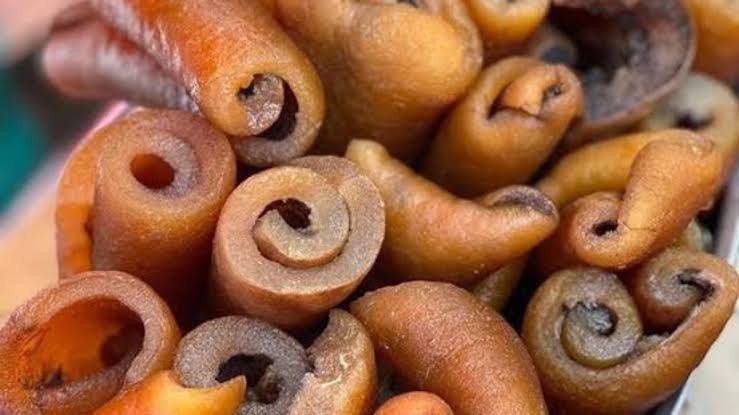News
Lagos residents defy govt’s warning on hide (ponmo) consumption

Despite the warning by the Federal Government on purchase of cow skin (ponmo) due to the outbreak of Anthrax disease in some neighbouring countries, the trade in the commodity still thrives.
A survey of some markets at Mushin, Egbeda, Oshodi and Ikotun, all in Lagos State, by our correspondent revealed that the demand for ponmo hasn’t dropped.
This is in spite of the announcement made by the government.
The Federal Government had, on June 13, alerted the general public, to the outbreak of anthrax disease in some neighbouring countries within the West African sub-region.
It advised Nigerians to desist from the consumption of hides at the moment.
The statement read in part, “the disease, which has claimed some lives, is a bacterial disease that affects both animals and man that is a zoonotic disease.
It said that anthrax spores are naturally found in the soil and commonly affect domestic and wild animals.
It specifically stated that the disease was widespread in Northern Ghana, bordering Burkina Faso and Togo.
A Housewife, Mrs Adewunmi Onalaja, told our correspondent that she did not know how to stop buying ponmo because her family enjoyed it.
“I’d be lying if I say I haven’t heard the announcement, but it’s hard to comply. When the news broke out, I was afraid initially but after a week I spoke with my customer and she told me she hasn’t gone to the market of late, so I bought from her.
“The only precaution I will take is that when the one I stocked up from my customer finishes, I will stop buying till it’s safe,” Onalaja said.
Chidera Ezeokocha, who runs a restaurant at Egbeda, told our correspondent that cooking local delicacies such as Afang, Edikaikong and Egusi stew are almost impossible without cow hides.
“I still put ponmo in my soups, those soups are incomplete without them, but I make sure I season it well. I thought the announcement was to alert us about poisonous ponmo.
“If I see a ponmo that is not good I will know, I have been in this food business long enough for me to know that a particular ponmo is bad,” Chidera said.
Sakirat Rafiu, who hawks peppered cow skin, told our correspondent that she doubted if Nigerians could obey government’s warning.
“The truth is that I don’t believe Nigerians will stop trading in ponmo, except they start getting arrested, which I am not sure is possible.
“Ponmo is cheap and demand for it is high and with how expensive things are, people don’t have a choice,” she said.
Kikiopefoluwa Idris, a businesswoman, said that she couldn’t be bothered about the warning on ponmo comsumption because she had never been a fan of ponmo.
“I have always preferred the dried ponmo; the ones you have to dip inside water to soften it. I buy that in bulk because it has longer life span than the fresh ones displayed in the open market,” Idris said.
On her part, Mrs Esther Adebamowo, the Market Leader (Iyaloja), Olugbede Market in Egbeda, appealed to buyers and sellers to comply with government’s directive.
“Government knows it all, and they’re particular about our wellbeing. I’d advise that we listen to them, it’s better to be safe than sorry.
“On our part, there’s nothing we can do to stop the buying and selling of ponmo, except government comes out to say anyone caught selling or buying will be punished.
“I as Iyaloja can’t sanction the sellers,” Adebamowo said.
It was reported that the government had resuscitated a standing committee on the control of anthrax in the Federal Ministry of Agriculture and Rural Development.
People can get infected with anthrax spores by coming in contact with infected animals or contaminated animal products.
The silver lining is the fact that Anthrax is not a contagious disease, and so, one cannot get it by coming in close contact with an infected person.
The signs of anthrax are flu-like symptoms such as cough, fever, muscle aches and if not diagnosed and treated early, leads to pneumonia, severe lung problems, difficulty in breathing, shock and death.




 Davido's Net Worth & Lifestyle
Davido's Net Worth & Lifestyle 
